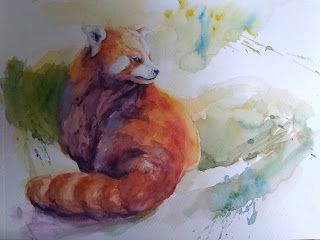Media Literacy (3)
Chapter 11: Media Knowledges, Warrior Citizenry and Postmodern Literacies (Peter McLaren and Rhonda Hammer)
Media knowledges are accumulated through collective cognitive engagement in various cultural forms such as film, television and radio, and the complexity of media forms calls for postmodern literacies. To that extent, media knowledge is refered as "perpetual pedagogy" delivered by the postmodern flaneur, who carries a camera and bombard audience with assembled images in which geohistorical context of an event is annihilated. The power of media subjugates our subjectivities and cognition of social structure and struggles, and thus controls political life; therefore education on critical media literacy is necessary and the aim of the education is to create "communities of resistance, counter-hegemonic sphere and oppositioned pedagogy." (P.137, dilemmas on the credibility of the critical pedagogy of media literacy are explained, but I don't get it.)
Chapter 12: Media Power (Per-)Formed (Rich Dolphijn)
An interesting cultural observation about formations of cities in correlation to historical media invention. He starts his argument with a comparision between dualist and monist way of thinking. McLuhan, as monist, acknowldges that new media add new dimensions to the existing world--instead of creating a new space, such as "cyberspace"--and make it a more complexed unity. From this standpoint, he examines the recent formations of Chinese cities. Chinese urban structure doesn't have a center and there seems no such structure of urban and suburban or countryside as seen in the western society. Here is a resemblance between pre-industrial period and post-digital revolution. But, so what? Does this help understand current socio-economic-political climates in China?
Media knowledges are accumulated through collective cognitive engagement in various cultural forms such as film, television and radio, and the complexity of media forms calls for postmodern literacies. To that extent, media knowledge is refered as "perpetual pedagogy" delivered by the postmodern flaneur, who carries a camera and bombard audience with assembled images in which geohistorical context of an event is annihilated. The power of media subjugates our subjectivities and cognition of social structure and struggles, and thus controls political life; therefore education on critical media literacy is necessary and the aim of the education is to create "communities of resistance, counter-hegemonic sphere and oppositioned pedagogy." (P.137, dilemmas on the credibility of the critical pedagogy of media literacy are explained, but I don't get it.)
Chapter 12: Media Power (Per-)Formed (Rich Dolphijn)
An interesting cultural observation about formations of cities in correlation to historical media invention. He starts his argument with a comparision between dualist and monist way of thinking. McLuhan, as monist, acknowldges that new media add new dimensions to the existing world--instead of creating a new space, such as "cyberspace"--and make it a more complexed unity. From this standpoint, he examines the recent formations of Chinese cities. Chinese urban structure doesn't have a center and there seems no such structure of urban and suburban or countryside as seen in the western society. Here is a resemblance between pre-industrial period and post-digital revolution. But, so what? Does this help understand current socio-economic-political climates in China?


Comments